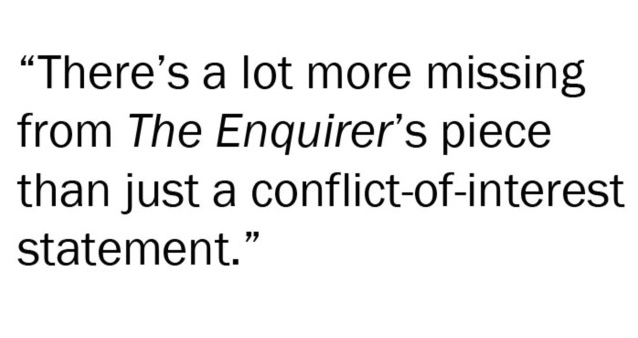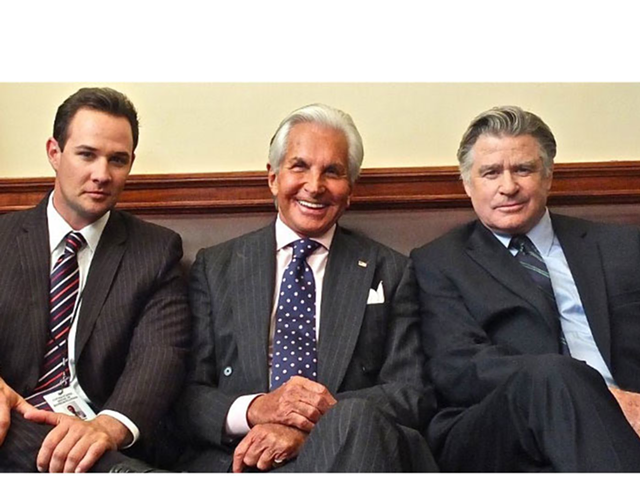There’s a quirky line in The Cincinnati Enquirer’s “2016 Editorial Agenda,” which in January introduced its readers to a restructured, five-person editorial board. The column reaffirms the board’s dedication to a promise the publication made 175 years ago to weigh in on the most pressing issues of the day “in a firm and unflinching, yet ever dignified and courteous manner.”
“Collectively we have lived in Cincinnati more than a half century, and we love this community just as you do,” the editorial board writes.
Doesn’t 50 years seem like a relatively short amount of time for five people to spend learning about and appreciating all that this great city has to offer?
More curious than this line, however, is the timing of the board’s recent show of support for tearing down the Dennison Hotel building on Main Street. That opinion came in an editorial published April 19, a few days after a Historic Conservation Board staff report emphatically recommended denying the owner’s demolition application. The building’s owner, Joseph Auto Group, asked to delay the formal vote for a few weeks so it could respond to the report in a hearing.
Within days, The Enquirer had Joseph’s back.
“The editorial board believes it should be demolished in the name of future growth in an important corner of Downtown,” the Enquirer editorial said of the Dennison.
In spite of the editorial board’s January declaration of a new day — to its credit, the board did directly acknowledge controversial topics like racial inequality and LGBTQ issues, which it has historically ignored — The Enquirer’s latest offering was a typical ode to the powers that be.
In this case, it’s also a questionable position to take ethically, considering how much money Joseph Auto Group spends advertising in The Cincinnati Enquirer. A full-screen ad on The Enquirer’s home page this week previewed the upcoming “Beyond the Stripes” Bengals show, sponsored by JosephAuto.com.
There’s a lot more missing from The Enquirer’s piece than just a conflict-of-interest statement, though.
Titled “It’s time to let the Dennison go,” the column’s unnamed writer — this is from all five of them, remember — embarks on a surface-level quest to put the weight of the daily newspaper behind the Joseph family’s Columbia REI development company, which only days earlier had its demolition application torn apart by the city’s urban conservator.
In its attempt to “lift up our community, in all its diversity,” as the current Enquirer regime says it will use its influence to do, the editorial board included architectural renderings provided by the Joseph Auto Group illustrating the shiny corporate headquarters of an as-yet-unknown Fortune 500 company that could theoretically be built at the site. This is, coincidentally, the same pitch the Joseph family made during the 1980s when it knocked down other buildings on the same block, creating the parking lots still sitting there today.
The Enquirer’s argument is misleading and leaves out the most pertinent statements from Urban Conservator Beth Johnson, all while quoting Ron Joseph, CEO of Joseph Auto Group.
“The former Dennison Hotel is an example of a 124-year-old structure that has outlived its structural safety and usefulness,” reads the Enquirer editorial.
Contrast that with what Johnson wrote in the April 13 report recommending the demolition request be denied: “The Urban Conservator’s qualified and professional opinion after tour of the entire building on April 7, 2016 is that it is in need of rehabilitation but is in overall good repair and condition.”
The Enquirer also omits key information about the motivations behind the Joseph Auto Group’s purchase of the building, which is a separate questionable situation involving a 3CDC plan to convert the building into affordable housing for veterans. That plan fell through before an abrupt sale to Columbia.
“It was a bold idea, but the project failed to secure funding,” The Enquirer explains. “That endeavor’s failure is why Columbia Development Group owns the building at 716 Main St. today.”
What The Enquirer leaves out is that, by their own admission in filings with the conservation board, the Josephs purchased the Dennison in part to block affordable housing. “Since it was believed this type of use would have a damaging effect on their investment in particular and on the neighborhood in general, the family concluded it was necessary to acquire this property,” read documents filed by Columbia’s lawyers in response to conservation board questions.
No Enquirer report has mentioned this, though the Cincinnati Business Courier and CityBeat have reported on those documents.
Neither CityBeat’s news coverage nor this column is meant to be an authoritative ruling on whether the Dennison Hotel building should be smashed into dust.
We would prefer to trust the city’s experts to decide, though it seems they already have.
The larger issue is the seemingly brazen manipulation of the processes in place to decide such important issues.
Mayor John Cranley’s pick for city manager, Harry Black, has appointed five of the Historic Conservation Board’s seven current members, who will vote on the demolition application May 26.
That includes Cranley donor and controversial developer Shree Kulkarni, who in the past has battled the board on which he now serves over the right to tear down historic buildings.
Campaign finance records also show the Joseph family has contributed tens of thousands of dollars in recent years to Cranley and initiatives he’s championed.
Cranley says he wants to stay out of the Dennison situation and let the “free market” decide the building’s fate. But in a historic district like the one the Dennison occupies, that’s exactly what the Historic Conservation Board is supposed to do.
If only there were a daily newspaper willing to “exercise independent judgment and speak truth to the powerful when it’s needed,” which The Enquirer proclaimed it would start doing in January.
The political maneuvering behind the drama over the Dennison Hotel has been a long time coming, which is why it’s disappointing to see the city’s daily newspaper doing such a poor job of keeping people informed, to say nothing of its blatant pandering to the powerful.
If that’s what The Enquirer’s editorial board set out to do, then it shouldn’t have bothered writing a “2016 Editorial Agenda” — we could have all just expected the same old stuff this year.
CONTACT DANNY CROSS: [email protected]






